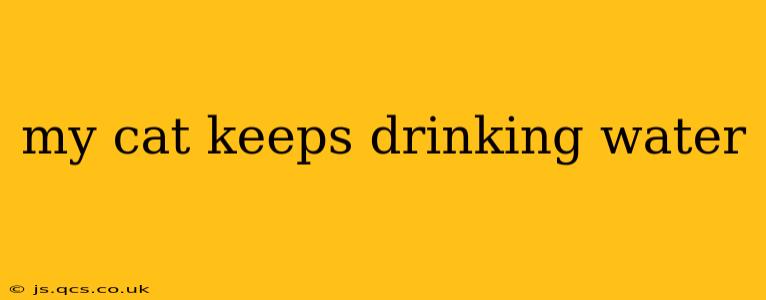Cats, like all animals, need water to survive. However, excessive water consumption, also known as polydipsia, in cats can be a sign of several underlying health issues. While a slightly increased water intake might not be a cause for immediate concern, consistent and significant increases warrant a veterinary check-up. This comprehensive guide explores the reasons why your cat might be drinking more water than usual and what steps you should take.
Why is My Cat Drinking So Much Water?
Increased water intake in cats can stem from various factors, ranging from simple environmental changes to serious medical conditions. Let's delve into some of the most common causes:
Diabetes Mellitus: This is a frequent culprit. When a cat has diabetes, their body doesn't produce enough insulin or can't use insulin effectively. This leads to high blood glucose levels, causing the kidneys to work overtime to filter the excess glucose, resulting in increased urination and thirst.
Kidney Disease (Chronic Kidney Disease or CKD): Kidney disease is another major cause of polydipsia. As the kidneys lose their ability to filter waste products and maintain proper fluid balance, cats compensate by drinking more water to flush out toxins. This is often accompanied by increased urination.
Hyperthyroidism: An overactive thyroid gland can accelerate metabolism, leading to increased thirst and urination. Cats with hyperthyroidism often exhibit other symptoms like weight loss, increased appetite, and restlessness.
Urinary Tract Infections (UTIs): UTIs can cause discomfort and inflammation in the bladder, prompting cats to drink more water in an attempt to flush out the infection. Other signs of UTIs can include straining to urinate, frequent urination, and blood in the urine.
Dietary Changes: A sudden change in diet, particularly to a higher-protein diet, can sometimes increase water intake. This is usually temporary, but it's crucial to monitor your cat's water consumption.
Environmental Factors: Hot weather, decreased water bowl accessibility, or a change in water source (e.g., switching to a different type of water bowl or water source) can influence water intake.
Stress or Anxiety: While less common, stress can sometimes lead to increased thirst. Changes in the household, new pets, or even loud noises can trigger stress in cats.
How Much Water is Too Much for My Cat?
There's no single answer to this question. The normal water intake for a cat varies based on factors such as age, weight, activity level, diet, and health. However, a noticeable and sustained increase in water consumption beyond your cat's usual habits warrants a vet visit. Observe your cat closely; are they drinking more frequently, finishing their water bowl faster than normal, or visiting the water bowl multiple times during the night?
What Should I Do if My Cat is Drinking Excessive Amounts of Water?
If you notice a significant and persistent increase in your cat's water intake, it's essential to consult your veterinarian immediately. They can conduct a thorough examination, including blood and urine tests, to identify the underlying cause. Early diagnosis and treatment are crucial for managing conditions like diabetes and kidney disease.
What are some other symptoms to look out for alongside increased water intake?
This is a very important question. Often, increased thirst is accompanied by other symptoms. These could include:
- Increased urination: This often goes hand-in-hand with increased thirst. Look for more frequent trips to the litter box, larger amounts of urine, or accidents outside the litter box.
- Weight loss: Unexpected weight loss can indicate underlying metabolic issues such as diabetes or hyperthyroidism.
- Lethargy or weakness: A cat suffering from kidney disease or other serious illness might show decreased energy levels.
- Changes in appetite: Increased or decreased appetite can be a symptom of various health problems.
- Vomiting or diarrhea: These digestive issues could be related to kidney disease or other medical conditions.
Don't hesitate to seek professional veterinary care if you notice any of these symptoms along with increased water consumption. Your cat's health is paramount, and early intervention can make all the difference. Remember, your veterinarian is the best resource for diagnosing and treating any health concerns your cat might have.
